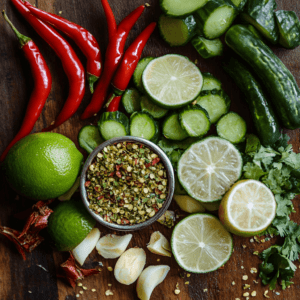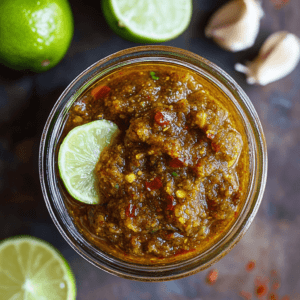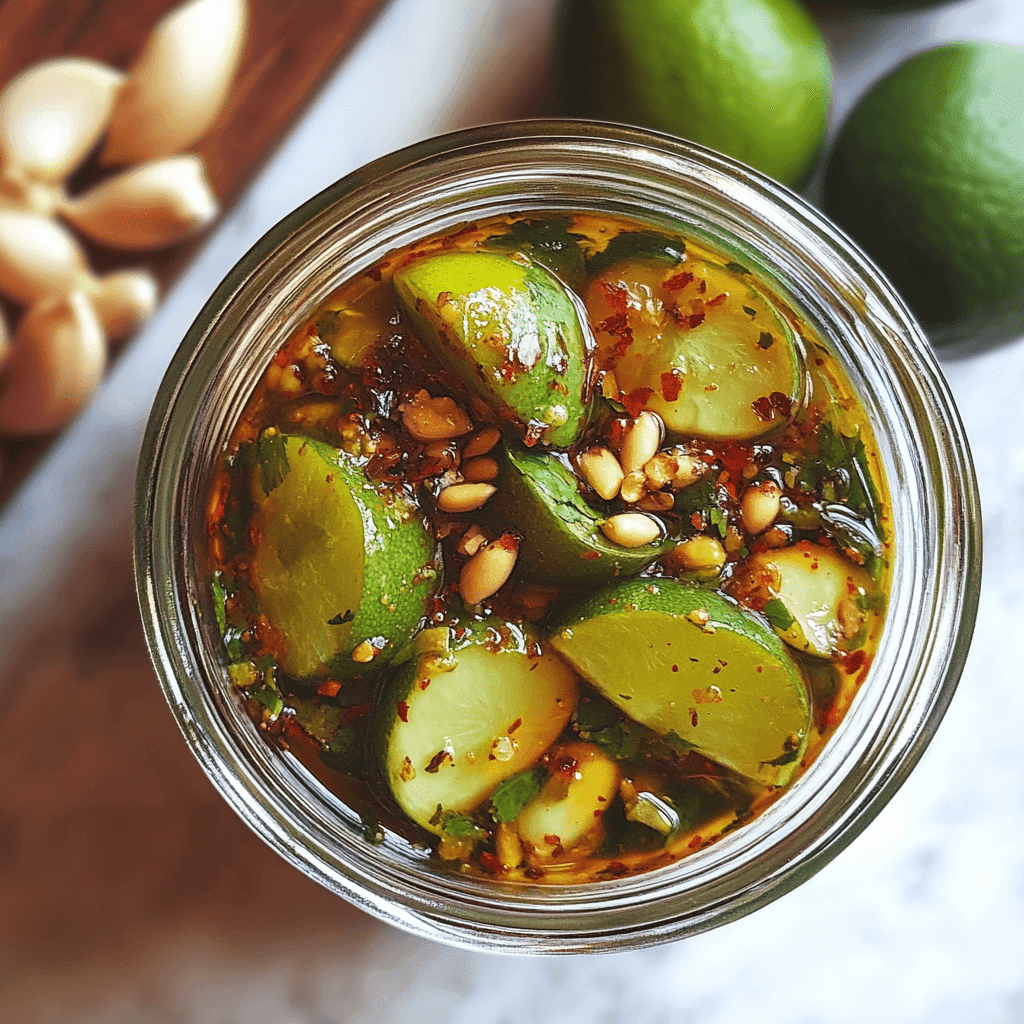If you’re wondering, “Why does my lime pickle taste bitter?” you’re not alone. Bitter lime pickle can result from several factors, and understanding these can help you achieve the perfect balance of flavors in your homemade or store-bought pickle.
Introduction to Lime Pickle
Lime pickle is a beloved condiment cherished in many households for its tangy and spicy flavors that elevate a variety of dishes. Its vibrant taste pairs well with rice, bread, and even grilled meats, making it a versatile addition to meals. However, sometimes, your lime pickle might surprise you with an unexpected bitter taste. Understanding why this happens can help you adjust your recipe and preparation methods to enjoy a perfectly balanced pickle every time.
The Popularity of Lime Pickle Worldwide
Lime pickle isn’t confined to a single cuisine; its popularity spans across continents. In South Asian countries like India, Pakistan, and Bangladesh, lime pickle is a staple accompaniment to daily meals. Its unique flavor profile, combining tanginess with spiciness, appeals to a wide range of palates. Additionally, as global cuisines become more intertwined, lime pickle is gaining fans worldwide who appreciate its bold taste.
Common Ingredients Used
Creating the perfect lime pickle involves a careful selection of ingredients. Fresh limes are the star, providing the essential tangy base. Other common ingredients include salt, a blend of spices like chili powder, mustard seeds, fenugreek, and asafoetida (hing), and oils such as sesame or mustard oil. These components are meticulously combined and allowed to ferment, developing the pickle’s signature flavors and textures.
Understanding Bitterness in Pickles
Bitterness is a complex flavor that, when balanced correctly, can add depth to foods. However, in pickles, excessive bitterness can make the condiment unpalatable. It’s essential to identify what causes bitterness to ensure your lime pickle remains delicious.
What Causes Bitterness in Foods?
Bitterness in foods can arise from several factors, including the types and amounts of spices used, over-fermentation, and the quality of primary ingredients. Certain spices naturally possess bitter notes, and if not balanced properly, these can dominate the overall flavor. Additionally, improper processing or storage can exacerbate bitterness.
Specific Factors Affecting Lime Pickle
In the case of lime pickle, bitterness can stem from multiple sources:
- Overuse of Specific Spices: Using too much of certain spices like mustard seeds or fenugreek can introduce strong bitter notes.
- Improper Fermentation: Allowing the pickle to ferment for too long or under unsuitable conditions can lead to over-fermentation, resulting in a bitter taste.
- Quality of Ingredients: Using old or spoiled limes can contribute unwanted bitterness to the final product.
Understanding these factors is crucial to preventing and correcting bitterness in your lime pickle.
Overuse of Spices and Their Impact
Spices are the backbone of any pickle, providing the essential flavors that make the condiment enjoyable. However, balance is key. Using too much spice can turn a delightful pickle into a bitter disappointment.
Common Spices in Lime Pickle
Typical spices used in lime pickle include:
- Chili Powder: Adds heat and color.
- Mustard Seeds: Imparts a pungent flavor.
- Fenugreek: Provides a slightly sweet, nutty flavor.
- Asafoetida (Hing): Adds a unique aroma and flavor. Each of these spices contributes to the overall taste, but their quantities must be carefully measured to prevent bitterness.
How Excess Spices Lead to Bitterness
When spices are used in large amounts, their inherent bitter compounds can become overpowering. For example, too much mustard seeds can make the pickle taste harsh, while excessive fenugreek may introduce a strong, bitter undertone. Achieving the right balance ensures that no single spice dominates, maintaining a harmonious flavor profile.
Improper Fermentation Techniques
Fermentation is a crucial process in developing the flavors of lime pickle. However, improper fermentation can lead to undesirable bitterness, ruining the pickle’s taste.
The Fermentation Process Explained
Fermentation involves allowing the pickle to sit and develop flavors over time. This process not only preserves the lime but also enhances its flavors, making the pickle more complex and tasty. The right fermentation conditions are essential to ensure the pickle develops correctly without becoming overly sour or bitter.
Signs of Over-Fermentation
Over-fermentation occurs when the pickle is left to ferment for too long or under unsuitable conditions. Signs include:
- Overly Sour or Bitter Taste: The pickle becomes excessively sour or bitter.
- Off-Smells: Unpleasant or unusual odors indicate spoilage.
- Texture Changes: The lime pieces may become mushy or overly hard. Recognizing these signs early can help in taking corrective actions to salvage the pickle.
Quality of Ingredients
The quality of the ingredients used plays a significant role in the final taste of lime pickle. Fresh, high-quality components are essential for a flavorful and non-bitter pickle.
Importance of Fresh Limes
Using fresh limes ensures that the pickle has a vibrant and tangy flavor without any underlying bitterness. Old or spoiled limes can introduce unwanted bitter notes and affect the overall quality of the pickle. Selecting ripe, firm limes is crucial for achieving the best taste.
Choosing the Right Salt and Oil
Salt is not only a flavor enhancer but also plays a role in the fermentation process. Similarly, the type of oil used can influence the taste. Mustard oil, for instance, has a strong flavor that can become bitter if not used in the right amount. Opting for high-quality salt and oil ensures that they contribute positively to the pickle’s flavor without introducing bitterness.
Storage Conditions
Proper storage is vital to maintaining the quality of lime pickle. Incorrect storage can accelerate fermentation and spoil the pickle, leading to bitterness.
Ideal Storage Practices for Lime Pickle
Store lime pickle in a cool, dark place in airtight containers. This helps slow down the fermentation process and preserves the pickle’s intended flavors. Using sterilized jars can also prevent contamination and spoilage.
How Poor Storage Leads to Bitterness
Exposure to heat, light, or air can cause the pickle to ferment too quickly or develop mold, both of which can result in a bitter taste. Additionally, fluctuating temperatures can disrupt the fermentation process, leading to inconsistent flavors.
Balancing Flavors
Achieving the right balance of flavors is crucial to a good lime pickle. Sweetness, tanginess, and spiciness should complement each other without any single flavor overpowering the rest.
Achieving the Right Sweetness to Counter Bitterness
Adding a touch of sugar or jaggery can help balance the bitterness by introducing sweetness, making the overall taste more harmonious. This counterbalance ensures that the bitterness does not dominate the pickle’s flavor profile.
Adding Ingredients to Enhance Flavor
Incorporating ingredients like garlic, ginger, or even a splash of lemon juice can enhance the pickle’s flavor and help mitigate bitterness. These additions not only add complexity to the taste but also contribute to a more balanced and pleasant flavor profile.
Common Mistakes to Avoid
Avoiding common pitfalls in the preparation of lime pickle can prevent bitterness and ensure a delicious outcome.
Over-Salting and Its Effects
Using too much salt can lead to a harsh, bitter taste. It’s essential to measure salt accurately and adjust according to taste preferences. Excess salt can overpower other flavors and contribute to bitterness.
Ignoring Fermentation Time
Neglecting to monitor fermentation can result in over-fermented pickle. It’s important to follow recommended fermentation times and check the pickle regularly. Setting a timer or keeping a fermentation diary can help manage this process effectively.
Remedies to Fix Bitter Lime Pickle
If your lime pickle has turned out bitter, there are several ways to salvage it and enhance its flavor.
Adjusting Spices Post Fermentation
Reducing the amount of spicy ingredients or adding more mild spices can help balance the bitterness. Introducing ingredients like fresh herbs or a small amount of sugar can also mitigate the bitter taste.
Diluting with Fresh Lime or Other Ingredients


Adding fresh lime juice or mixing in other non-bitter pickles can dilute the bitterness and restore the desired taste. This method helps in balancing the overall flavor without compromising the pickle’s integrity.
Preventive Measures for Future Batches
To ensure your lime pickle remains flavorful and non-bitter in future preparations, consider the following tips.
Tips for Consistent Pickle Quality
Maintain consistency in ingredient measurements, fermentation times, and storage conditions to achieve a reliable and pleasant taste every time. Keeping a standardized recipe can help in replicating successful batches.
Monitoring Fermentation Carefully
Regularly check the pickle during fermentation, tasting it periodically to ensure it doesn’t become over-fermented. Adjusting environmental factors like temperature and humidity can also aid in controlling the fermentation process.
Frequently Asked Questions (FAQs)
1. How can I reduce bitterness in my lime pickle?
To reduce bitterness, consider adding a bit of sugar or jaggery to balance the flavors. Additionally, you can dilute the pickle with fresh lime juice or incorporate other non-bitter ingredients such as garlic or ginger. Adjusting the spice levels by reducing the quantity of bitter spices can also help in achieving a more balanced taste.
2. What spices cause lime pickle to taste bitter?
Spices like mustard seeds, fenugreek, and asafoetida (hing) can contribute to bitterness if used in excess. Mustard oil, if overused, can also impart a bitter flavor. It’s important to measure spices accurately and adjust according to taste preferences to prevent bitterness.
3. Is over-fermentation the only cause of bitterness?
No, while over-fermentation is a common cause of bitterness in lime pickle, other factors can also contribute to this issue. The quality of ingredients plays a crucial role, as using old or overripe limes may result in an undesirable taste. Additionally, the excessive use of certain spices, such as fenugreek or mustard seeds, can introduce bitterness if not balanced properly. To prevent this, always select fresh, firm limes and use high-quality spices in the right proportions. Proper fermentation techniques, including storing the pickle in a cool, dark place and ensuring airtight storage, also help maintain the intended flavor. Regularly tasting and monitoring the pickle during fermentation can further ensure the desired taste and texture.
4. Can adding sugar balance the bitterness?
Yes, incorporating a small amount of sugar or jaggery can effectively balance the flavors of lime pickle by reducing bitterness and adding a subtle sweetness. This simple yet effective adjustment enhances the overall taste without drastically changing the traditional flavor profile. The natural sweetness of jaggery or sugar helps mellow the sharpness of the lime while complementing the spices used in the pickle. Additionally, this method allows for a smoother and more enjoyable taste, making the pickle more palatable while preserving its authentic essence. Adjust the quantity according to personal preference to achieve the perfect balance of flavors.
5. How long should lime pickle be fermented?
Lime pickle generally requires a fermentation period of approximately 7 to 10 days to develop its signature tangy and complex flavors. However, the exact duration may vary depending on factors such as temperature, humidity, and personal taste preferences. Warmer conditions tend to accelerate fermentation, while cooler environments may slow it down. To achieve the best results, it is advisable to monitor the pickle daily, checking for changes in texture, aroma, and taste. Stirring it occasionally can also help distribute flavors evenly. Adjusting the fermentation time based on observation ensures that the pickle reaches the perfect balance of sourness and spice to suit individual preferences.
6. What storage conditions prevent bitterness?
To maintain the quality and flavor of lime pickle, store it in an airtight container in a cool, dark place. Proper storage is essential to slow down the fermentation process and prevent the pickle from developing an unwanted bitter taste. Exposure to heat, light, and air can alter its texture and flavor, making it less enjoyable over time. Using glass or ceramic containers with tight-sealing lids is ideal, as they help preserve the pickle’s aroma and taste. Additionally, always use a clean, dry spoon when scooping out the pickle to prevent contamination and prolong its shelf life.
Conclusion
A bitter lime pickle can be disappointing, but understanding the underlying causes allows you to adjust your preparation and storage methods to achieve the perfect taste. By carefully selecting fresh ingredients, monitoring fermentation, balancing spices, and following proper storage practices, you can enjoy a delicious and flavorful lime pickle every time. Remember to avoid common mistakes and implement preventive measures to ensure consistency in your pickle-making endeavors.
Related article:

